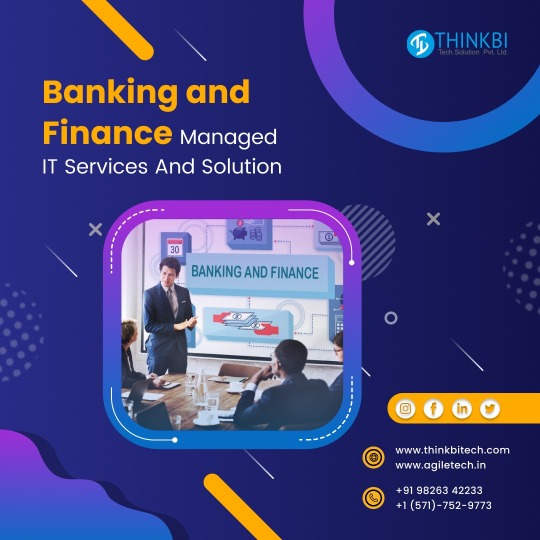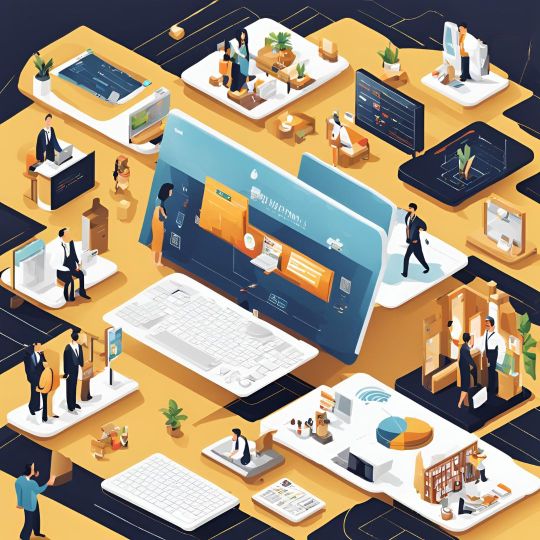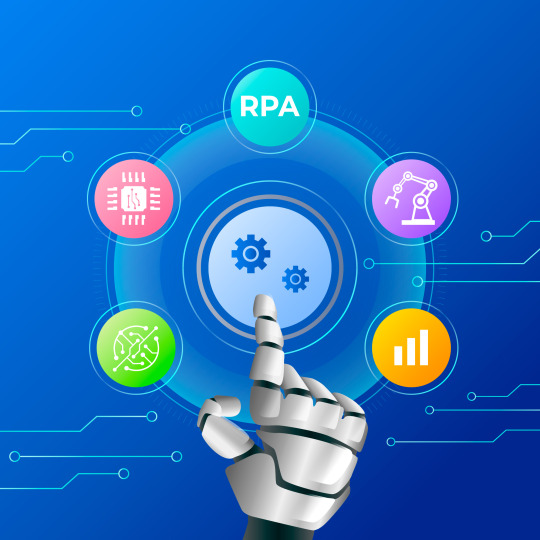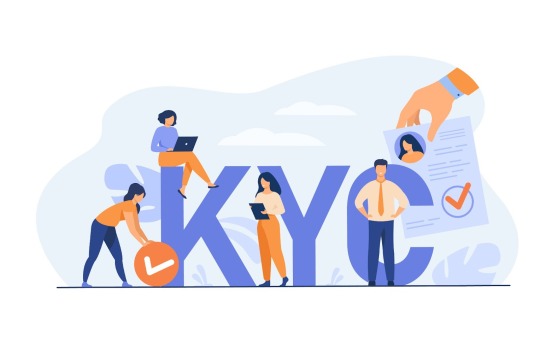#banking software solutions
Explore tagged Tumblr posts
Text
How Software is Reshaping Customer Experiences
In the digital age, customer experience has become a top priority for businesses across all industries, and banking is no exception. With the advent of advanced software technologies, banks are revolutionizing the way they interact with and serve their customers. Let's delve into how software is reshaping customer experiences in the banking sector:
Personalized Service: Banking software is enabling personalized service like never before. Through data analytics and AI algorithms, banks can analyze customer behavior, preferences, and financial patterns to offer tailored products and services. Whether it's suggesting personalized investment options or providing targeted financial advice, banks can now cater to the unique needs of each customer.
Omni-channel Experience: Modern customers expect seamless experiences across various channels, be it online banking platforms, mobile apps, or in-person interactions. Banking software allows for the integration of these channels, ensuring that customers can access their accounts and perform transactions effortlessly, regardless of the platform they choose.
24/7 Accessibility: Gone are the days of being restricted by banking hours. With software solutions, customers have round-the-clock access to their accounts and banking services. Whether it's checking account balances, transferring funds, or applying for loans, customers can do it all at their convenience, from anywhere in the world.
Streamlined Processes: Software streamlines banking processes, reducing the time and effort required for both customers and bank employees. From opening new accounts to processing loan applications, automation and digitization make these processes faster, more efficient, and error-free, leading to improved customer satisfaction.
Enhanced Security: Security is paramount in the banking industry, and software plays a crucial role in ensuring the safety of customer data and transactions. Advanced encryption techniques, biometric authentication, and fraud detection algorithms protect customers from cyber threats and identity theft, instilling confidence and trust in the banking system.
Proactive Communication: Software enables banks to engage with customers proactively, keeping them informed about important updates, upcoming events, and relevant offers. Whether it's sending personalized notifications about account activity or offering targeted promotions based on customer preferences, proactive communication strengthens the bond between banks and their customers.
Feedback and Improvement: Software allows banks to gather valuable feedback from customers through surveys, reviews, and social media interactions. This feedback loop enables banks to identify areas for improvement and make necessary adjustments to enhance the overall customer experience continually.
In conclusion, banking software is transforming the way customers interact with banks, offering personalized service, seamless omni-channel experiences, enhanced security, and proactive communication. By leveraging these software solutions, banks can build stronger relationships with their customers, drive loyalty, and stay ahead in today's competitive market.
#banking software#online banking#banking software solutions#core banking software#digital banking software#mobile banking software
0 notes
Text

Banking Software Solutions | Banking App Developers | ThinkBI
0 notes
Text
With Innrly | Streamline Your Hospitality Operations

Manage all your hotels from anywhere | Transformation without transition
Managing a hotel or a multi-brand portfolio can be overwhelming, especially when juggling multiple systems, reports, and data sources. INNRLY, a cutting-edge hotel management software, revolutionizes the way hospitality businesses operate by delivering intelligent insights and simplifying workflows—all without the need for system changes or upgrades. Designed for seamless integration and powerful automation, INNRLY empowers hotel owners and managers to make data-driven decisions and enhance operational efficiency.
Revolutionizing Hotel Management
In the fast-paced world of hospitality, efficiency is the cornerstone of success. INNRLY’s cloud-based platform offers a brand-neutral, user-friendly interface that consolidates critical business data across all your properties. Whether you manage a single boutique hotel or a portfolio of properties spanning different regions, INNRLY provides an all-in-one solution for optimizing performance and boosting productivity.
One Dashboard for All Your Properties:
Say goodbye to fragmented data and manual processes. INNRLY enables you to monitor your entire portfolio from a single dashboard, providing instant access to key metrics like revenue, occupancy, labor costs, and guest satisfaction. With this unified view, hotel managers can make informed decisions in real time.
Customizable and Scalable Solutions:
No two hospitality businesses are alike, and INNRLY understands that. Its customizable features adapt to your unique needs, whether you're running a small chain or managing an extensive enterprise. INNRLY grows with your business, ensuring that your operations remain efficient and effective.
Seamless Integration for Effortless Operations:
One of INNRLY’s standout features is its ability to integrate seamlessly with your existing systems. Whether it's your property management system (PMS), accounting software, payroll/labor management tools, or even guest feedback platforms, INNRLY pulls data together effortlessly, eliminating the need for system overhauls.
Automated Night Audits:
Tired of labor-intensive night audits? INNRLY’s Night Audit+ automates this crucial process, providing detailed reports that are automatically synced with your accounting software. It identifies issues such as declined credit cards or high balances, ensuring no problem goes unnoticed.
A/R and A/P Optimization:
Streamline your accounts receivable (A/R) and accounts payable (A/P) processes to improve cash flow and avoid costly mistakes. INNRLY’s automation reduces manual entry, speeding up credit cycles and ensuring accurate payments.
Labor and Cost Management:
With INNRLY, you can pinpoint inefficiencies, monitor labor hours, and reduce costs. Detailed insights into overtime risks, housekeeping minutes per room (MPR), and other labor metrics help you manage staff productivity effectively.
Empowering Data-Driven Decisions:
INNRLY simplifies decision-making by surfacing actionable insights through its robust reporting and analytics tools.
Comprehensive Reporting:
Access reports on your schedule, from detailed night audit summaries to trial balances and franchise billing reconciliations. Consolidated data across multiple properties allows for easy performance comparisons and trend analysis.
Benchmarking for Success:
Compare your properties' performance against industry standards or other hotels in your portfolio. Metrics such as ADR (Average Daily Rate), RevPAR (Revenue Per Available Room), and occupancy rates are presented in an easy-to-understand format, empowering you to identify strengths and areas for improvement.
Guest Satisfaction Insights:
INNRLY compiles guest feedback and satisfaction scores, enabling you to take prompt action to enhance the guest experience. Happy guests lead to better reviews and increased bookings, driving long-term success.

Key Benefits of INNRLY
Single Login, Full Control: Manage all properties with one login, saving time and reducing complexity.
Error-Free Automation: Eliminate manual data entry, reducing errors and increasing productivity.
Cost Savings: Pinpoint problem areas to reduce labor costs and optimize spending.
Enhanced Accountability: Hold each property accountable for issues flagged by INNRLY’s tools, supported by an optional Cash Flow Protection Team at the enterprise level.
Data Security: Protect your credentials and data while maintaining your existing systems.
Transforming Hospitality Without Transition
INNRLY’s philosophy is simple: transformation without transition. You don’t need to replace or upgrade your existing systems to benefit from INNRLY. The software integrates effortlessly into your current setup, allowing you to focus on what matters most—delivering exceptional guest experiences and achieving your business goals.
Who Can Benefit from INNRLY?
Hotel Owners:
For owners managing multiple properties, INNRLY offers a centralized platform to monitor performance, identify inefficiencies, and maximize profitability.
General Managers:
Simplify day-to-day operations with automated processes and real-time insights, freeing up time to focus on strategic initiatives.
Accounting Teams:
INNRLY ensures accurate financial reporting by syncing data across systems, reducing errors, and streamlining reconciliation processes.
Multi-Brand Portfolios:
For operators managing properties across different brands, INNRLY’s brand-neutral platform consolidates data, making it easy to compare and optimize performance.
Contact INNRLY Today

Ready to revolutionize your hotel management? Join the growing number of hospitality businesses transforming their operations with INNRLY.
Website: www.innrly.com
Email: [email protected]
Phone: 833-311-0777
#Innrly#Innrly Hotel Management Software#Bank Integrations in Hospitality Software#Tracking Hotel Compliance#hotel performance software#hotel portfolio software#Hotel Performance Management Software#hotel reconciliation software#Hotel Data Entry Software#accounting software hotels#hotel banking software#hospitality automated accounting software#hotel automation software hotel bookkeeping software#back office hotel accounting software#hospitality back office software#accounting hospitality software#Hotel Management Accounting Software#Hotel Accounting Software#Hospitality Accounting Software#Accounting Software for Hotels#Hotel Budgeting Software#Automate Night Audit Software#Automate Night Audit Process#Best Hotel Accounting Software#Best Accounting Software For Hotels#Financial & Hotel Accounting Software#Hospitality Accounting Solutions
2 notes
·
View notes
Text
Unlocking Efficiency and Innovation: The Role of Robotic Process Automation (RPA)

In today's fast-paced and competitive business environment, organizations are constantly seeking ways to improve efficiency, reduce costs, and increase productivity. Robotic Process Automation (RPA) has emerged as a powerful tool that can help businesses achieve these objectives.
What is Robotic Process Automation (RPA)?
Robotic Process Automation (RPA) is a technology that allows businesses to automate repetitive, rule-based tasks. It uses software robots, also known as "bots," to mimic human actions and interact with digital systems. These bots can log into applications, navigate through screens, input data, and complete tasks just like humans would.
The Role of RPA in Business:
RPA can be used to automate a wide range of tasks across various industries and departments. Here are some examples:
Finance and Accounting: Automating tasks such as accounts payable and receivable, invoice processing, and financial reporting.
Customer Service: Automating tasks such as answering FAQs, resolving customer inquiries, and processing orders.
Human Resources: Automating tasks such as onboarding new employees, processing payroll, and managing benefits.
IT: Automating tasks such as provisioning accounts, managing user access, and deploying software updates.
Impact of RPA on Businesses:
Implementing RPA can offer numerous benefits to businesses, including:
Increased efficiency and productivity: RPA can automate time-consuming and tedious tasks, freeing up employees to focus on more strategic and value-added activities.
Reduced costs: RPA can help businesses save money on labor costs, as well as reduce errors and compliance risks.
Improved accuracy and compliance: RPA bots are programmed to follow specific rules and procedures, which can help to improve accuracy and compliance with regulations.
Enhanced process visibility and control: RPA provides businesses with a clear view of their processes, which can help them identify and address bottlenecks.
Improved customer satisfaction: RPA can help businesses improve customer satisfaction by automating tasks such as order processing and customer service interactions.
RPA Services:
Implementing RPA successfully requires a partner with expertise in the technology and a deep understanding of business processes. A comprehensive RPA solution should include the following services:
Document AS-IS Process: This involves mapping out the existing process to identify areas for automation.
Design & Development of Bots, workflows, and forms for process automation: This includes designing and developing the software robots that will automate the tasks.
Bot license (We will use the appropriate underlying technology): This provides access to the software robots and the underlying technology platform.
Infrastructure: This includes setting up the necessary infrastructure to support the Robotic Process Automation (RPA) solution.
Production Deployment of the Bots: This involves deploying the bots to production and monitoring their performance.
RPA support: This includes ongoing support for the RPA solution, such as troubleshooting and maintenance.
Test & Deploy bots to production: This involves testing the bots in a production environment and making any necessary adjustments before they are deployed to full production.
Configuration data changes: This involves making changes to the configuration data of the bots as needed.
Password updates: This involves updating the passwords of the bots as needed.
Errors in executing the Bots: This involves resolving errors that occur during the execution of the bots.
Determining the “root cause” of a recurring issue or incident & recommendations: This involves identifying the root cause of a recurring issue or incident and recommending solutions to prevent it from happening again.
Infrastructure/application related issues: This involves resolving issues with the infrastructure or applications that the bots are interacting with.
Conclusion:
RPA is a powerful technology that can have a significant impact on businesses of all sizes. By automating repetitive tasks, RPA can help businesses improve efficiency, reduce costs, and increase productivity. However, it is important to choose a reputable Robotic Process Automation (RPA) companies with the expertise and experience to help you implement a successful RPA solution.
Ready to embrace the power of RPA?
Contact us today to learn more about how RPA can help your business achieve its goals.
#robotic process automation#robotic process automation rpa#rpa automation#robotic process automation software#rpa software#robotic process automation companies#robotic process automation technology#robotic process automation in healthcare#robotic process automation in banking#rpa solution#robotic process automation for finance#process automation solution#robotic process automation services#robotic process automation for insurance#rpa system#what is rpa automation#robotic process automation solution#robotic process automation benefits#robotic process automation consulting#robotic process automation consultant#rpa service provider#rpa consulting services
2 notes
·
View notes
Text
KYC Provider UK
KYC Verification is essential to onboard a new client in UK businesses to authenticate the identity of a person associated with the business and even to check involvement in money laundering. We are one of the leading KYC providers in the UK and assist with KYC API for financial and non-financial businesses.

#KYC UK#KYC Provider UK#KYC Solutions UK#KYC Solutions Provider UK#banking#finance#fintech#gaming#kyc api#kyc software#kyc companies#banks
4 notes
·
View notes
Text
Expanding your business to multiple locations can be a great way to increase sales, reach new customers, and grow your brand. However, it can also be a challenge to manage multiple locations effectively. Suvit is an all-in-one accounting automation platform that strives to make finance cool again! Suvit is more than just a platform; it's a financial game-changer.
#tally solutions#automation for accountants#accounting automation software#automated bank statement processing#1950s#e invoice in tally#tally on cloud#tally automation
2 notes
·
View notes
Text
Fintech built smarter. 🤓💻
SDH integrates cutting-edge technologies with your vision. Digital banking, blockchain, personal finance apps—done right. Explore:
#financial software development#custom app solutions#fintech#SDH#digital banking#blockchain#personal finance apps
0 notes
Text

#On-Demand Banking & Finance Software Development Company#Banking Software Development#Banking Website Development Company#Banking & Finance Software Development Solutions UAE
0 notes
Text
Cybersecurity in Banking: Protecting Data with Advanced Solutions
Introduction
Discuss the critical importance of cybersecurity in the banking industry.
Highlight the rising threat of cyberattacks and the need for advanced protection measures.
Key Cybersecurity Challenges in Banking
Phishing and Social Engineering: Explain how attackers exploit customer vulnerabilities.
Ransomware Attacks: Highlight the growing trend of holding core banking data hostage.
Data Breaches: Discuss the risks associated with sensitive customer data exposure.
Advanced Cybersecurity Solutions
AI and Machine Learning: Explain how predictive analytics detect and prevent fraud in real time.
Multi-Factor Authentication (MFA): Describe how MFA adds an extra layer of security to customer accounts.
Blockchain for Secure Transactions: Highlight the use of blockchain for tamper-proof record-keeping.
Cloud Security Measures: Mention secure storage and disaster recovery in cloud environments.
Strategies for Banks to Enhance Cybersecurity
Conduct regular security audits and penetration testing.
Invest in employee training to identify and mitigate cyber threats.
Collaborate with cybersecurity firms for proactive threat management.
Conclusion
Emphasize the importance of adopting advanced cybersecurity solutions to protect customer trust and ensure compliance with regulations.
#qa testing services#core banking system#core banking solutions#t24 banking#online business banking#software testing#test automation solution#codeless test automation
0 notes
Text
Efficient IPO Application Processing System: A Revolution in Banking and Financial Solutions
In today’s rapidly evolving financial sector, technology plays a pivotal role in streamlining processes and enhancing customer experiences. One such innovation is the IPO Application Processing System, designed to facilitate the efficient management of Initial Public Offering (IPO) applications. As companies increasingly go public, the demand for efficient application processing has grown. Integrating these systems into broader banking and financial solutions ensures that financial institutions can handle IPO applications swiftly and accurately, improving both operational efficiency and customer satisfaction.
The Role of an IPO Application Processing System
An IPO Application Processing System is a specialized software solution that automates the handling of IPO applications. When companies launch IPOs, they attract many investors looking to buy shares. Processing these applications manually can be slow and prone to errors, especially with large volumes. An automated system eliminates these issues, offering a platform for collecting, validating and processing applications accurately.
These systems manage all stages of the IPO process, from the initial submission to the final allocation of shares. Additionally, they ensure compliance with regulatory standards, reducing the risk of errors that could result in financial or legal complications. For financial institutions, a robust IPO Application Processing System is essential for handling large volumes of applications efficiently and providing a seamless experience for their clients.
Key Benefits of an IPO Application Processing System
Efficiency: Automation accelerates the IPO process, allowing institutions to manage large numbers of applications quickly and accurately. This efficiency leads to better customer service and faster transaction times.
Accuracy: Manual processes often lead to errors, especially when processing a high volume of applications. An automated system ensures precision, reducing the likelihood of costly mistakes.
Compliance: IPO processing requires strict adherence to regulatory guidelines. An IPO Application Processing System is designed to ensure that every application meets these standards, minimizing the risk of non-compliance.
Enhanced Customer Satisfaction: Automation allows institutions to provide quicker and more transparent services, improving the overall customer experience and fostering trust with investors.
Integrating IPO Systems with Banking and Financial Solutions
The integration of IPO Application Processing Systems with existing banking and financial solutions creates a seamless workflow. Financial institutions can manage IPO applications alongside other services such as online banking and investment management. This comprehensive approach simplifies operations and enhances service delivery.
Integrated systems also provide real-time updates, enabling investors to track their application status and share allocations. This level of transparency is essential for building trust between financial institutions and their clients, leading to stronger customer relationships.
Winsoft: A Leader in Financial Technology Solutions
When it comes to delivering advanced banking and financial solutions, Winsoft stands out as a leading provider of innovative technology. Winsoft’s IPO Application Processing System helps financial institutions efficiently manage IPO applications, ensuring accuracy, compliance and customer satisfaction. By focusing on automation and seamless integration, Winsoft enables institutions to handle IPO applications alongside other financial services, streamlining operations and enhancing service quality.
Winsoft’s technology allows financial institutions to provide a smoother IPO application process, ensuring they remain competitive in the ever-evolving financial landscape.
Conclusion
In a competitive financial environment, adopting an efficient IPO Application Processing System is crucial for maintaining accuracy and speed. When integrated with banking and financial solutions, these systems enhance operational efficiency and improve the customer experience. Winsoft plays a pivotal role in offering advanced technology solutions that help financial institutions manage IPO applications seamlessly, ensuring compliance and building customer trust.
0 notes
Text
The Role of KYC Software Solutions in Modern Businesses
In the present quickly advancing business climate, consistency with administrative guidelines has become progressively significant. Monetary establishments, fintech organizations, and organizations that handle client information are expected to comply with rigid Know Your Customer (KYC) guidelines. To productively meet these necessities, organizations are going to KYC Software Solutions. These creative apparatuses improve on the method involved with confirming client characters and assist organizations with keeping away from exorbitant consistency issues.

What Are KYC Software Solutions?
KYC Software Solutions are robotized stages intended to assist organizations with checking the characters of their clients. These arrangements smooth out the client onboarding process by gathering, investigating, and approving client information against administrative data sets and guidelines. Whether you are dealing with a monetary foundation, a cryptographic money trade, or some other information weighty business, embracing KYC Verification Software can assist you with remaining consistent while lessening functional weights.
Why Your Business Needs KYC Verification Software
Utilizing KYC Verification Software is fundamental for organizations that need to guarantee they are managing genuine clients. This product normally incorporates highlights, for example,
Robotized information assortment from government data sets
Ongoing personality checks
Misrepresentation recognition calculations
Continuous checking of client profiles
By carrying out KYC Verification Software, organizations can keep away from gambles related with false exercises, for example, illegal tax avoidance and fraud. Also, these instruments make it simpler to adjust to switching administrative conditions by keeping your business around to-date with the most recent consistence necessities.
Picking the Best KYC Software
Choosing the Best KYC Software for your business relies upon a few variables, like the size of your tasks, the intricacy of administrative necessities, and the sorts of clients you serve. The Best KYC Software ought to:
Offer an easy to use interface for the two workers and clients.
Incorporate high level security elements to safeguard client information.
Give adjustable choices to suit your particular industry needs.
Be adaptable as your business develops and as guidelines advance.
In a market overflowed with choices, the Best KYC Software will likewise offer adaptability and joining with different frameworks you are now utilizing, like Client Relationship The board (CRM) devices or Undertaking Asset Arranging (ERP) programming.
The Advantages of Executing KYC Software Solutions
Organizations that take on KYC Software Solutions can anticipate a few advantages, including:
Upgraded Client Trust: Clients value organizations that find additional ways to guarantee information protection and security. Executing KYC Software Solutions communicates something specific that your organization values consistence and honesty.
Worked on Functional Proficiency: Manual cycles are inclined to blunders and deferrals. With computerized KYC Verification Software, you can lessen the time and cost engaged with personality confirmation and other consistence errands.
Administrative Consistence: Neglecting to follow KYC guidelines can bring about robust fines and legitimate outcomes. The Best KYC Software assists organizations with remaining agreeable without overpowering their groups with desk work.
Conclusion
In this present reality where information breaks and false exercises are on the ascent, carrying out KYC Software Solutions is as of now not discretionary — it's a need. With the right KYC Verification Software, organizations can safeguard themselves from monetary dangers, guarantee administrative consistency, and construct entrust with their clients. By choosing the Best KYC Software for your business, you can smooth out tasks, shield information, and keep an upper hand in an undeniably directed climate.
As organizations keep on adjusting to the computerized age, putting resources into powerful KYC Software Solutions is a stage toward a safer and productive future.
#CERSAI CKYC Solution#ckyc automation#kyc software solutions#kyc verification software#best kyc software#kyc automation tools#kyc banking software#kyc management software#kyc software providers
0 notes
Text
#retail banking software#retail banking system#what is retail banking#retail banking solutions#digital retail banking#international retail banking#retail internet banking
0 notes
Text
KYC API Provider in UK
Stay secure and protect your business from financial fraud using the KYC API. KYC helps verify business identities and facilitate fast customer onboarding for almost every UK industry's business. We are one of the most trusted KYC API providers in the UK and instantly deliver the most matching results for banking, finance, cryptocurrency, insurance, fintech, healthcare, and online gaming sectors.

#kyc verification#kyc#kyc api#KYC Solution Provider UK#KYC API Providers#KYC Companies#KYC Software#banking#finance#healthcare#insurance#cryptocurrency#gaming#fintech#UK KYC
3 notes
·
View notes
Text
Common Mistakes to Avoid When Managing GST Ledgers in Tally
Goods and Services Tax (GST) is a comprehensive indirect tax levy on the manufacture, sale, and consumption of most goods and services in Bharat. It was introduced on July 1, 2017, to subsume multiple indirect taxes, such as excise duty, value-added tax (VAT), service tax, and central sales tax (CST). GST ledgers in Tally are used to record all GST transactions, such as sales, purchases, and expenses. It is important to avoid mistakes in GST ledgers, as this can lead to penalties from the GST authorities.
#accounting automation software#GST Ledgers#GST#tally on cloud#automated bank statement processing#e invoice in tally#tally solutions
2 notes
·
View notes
Text
Discover effective tips to reduce wait times for customers in banks, including optimizing staff schedules, implementing digital queue systems, offering online services, and streamlining processes. Enhance customer satisfaction by minimizing delays and improving the overall banking experience.
#Smart Queue Management System For Banks#Queue management system for banks#Bank queue management solution#Banking queue management software
0 notes
Text
Fintech Software Development Services
#Banking Technology#Financial Solutions Innovations#Banking Technology Solutions#Financial Technology#Fintech Solutions#Digital Banking#Finance Industry Innovations#Banking Software#Financial Services Technology#Fintech Innovations#Banking IT Solutions#Financial Security Technology#Blockchain in Banking#AI in Finance#Banking Digital Transformation#Finance Sector Technology
0 notes